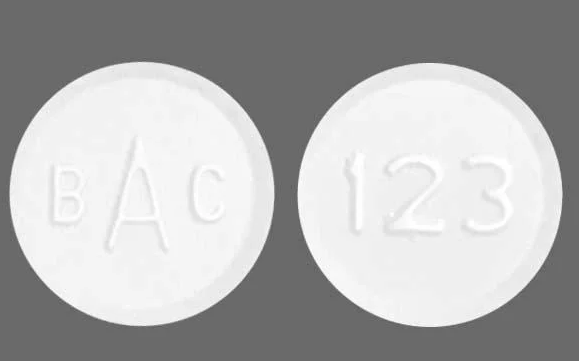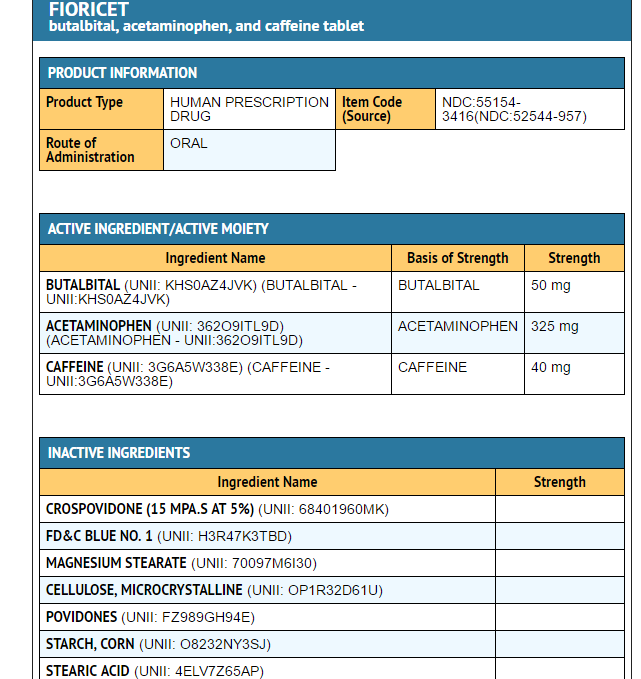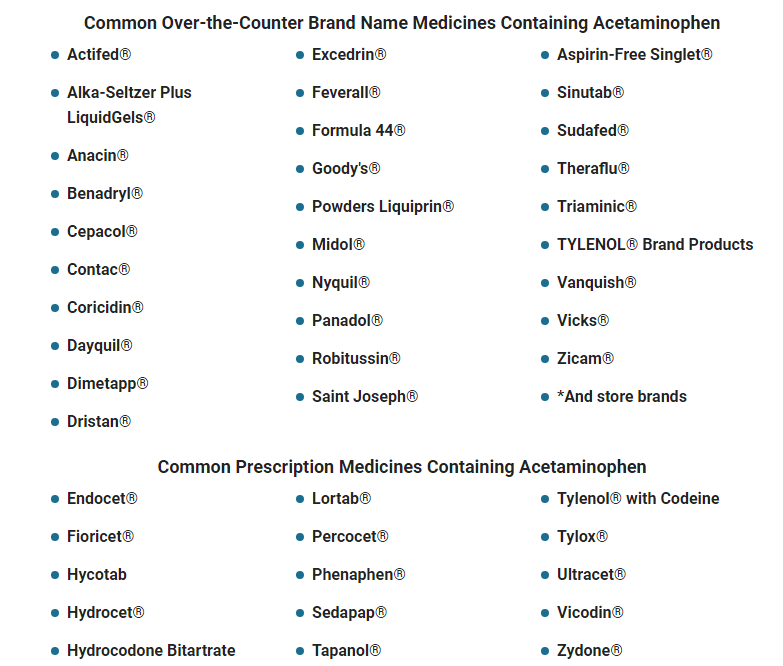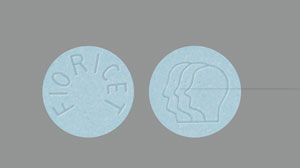Butalbital, acetaminophen, and caffeine combination is used to relieve symptoms of tension (or muscle contraction) headaches.
Butalbital belongs to the group of medicines called barbiturates. Barbiturates act in the central nervous system (CNS) to produce their effects.
Acetaminophen is used to relieve pain and reduce fever in patients. It does not become habit-forming when taken for a long time. But acetaminophen may cause other unwanted effects when taken in large doses, including liver damage.
When butalbital is used for a long time, it may become habit-forming, causing mental or physical dependence. However, people who have continuing pain should not let the fear of dependence keep them from using narcotics to relieve their pain. Physical dependence may lead to withdrawal side effects if treatment is stopped suddenly. However, severe withdrawal side effects can usually be prevented by gradually reducing the dose over a period of time before treatment is stopped completely.
Caffeine is a CNS stimulant that is used with pain relievers to increase their effect. It has also been used for migraine headaches. However, caffeine can also cause physical dependence when it is used for a long time. This may lead to withdrawal (rebound) headaches when you stop taking it.
This medicine is available only with your doctor’s prescription.
This product is available in the following dosage forms:
- Tablet
- Capsule

Side Effects of Fioricet
Along with its needed effects, a medicine may cause some unwanted effects. Although not all of these side effects may occur, if they do occur they may need medical attention.
Check with your doctor immediately if any of the following side effects occur:
More common
- Lightheadedness
- shortness of breath
Incidence not known
- Abdominal or stomach pain
- black, tarry stools
- bleeding gums
- blistering, peeling, or loosening of the skin
- blood in the urine or stools
- blurred vision
- change in the frequency of urination or amount of urine
- chills
- cough
- diarrhea
- difficulty with breathing
- difficulty with swallowing
- dizziness
- drowsiness
- dry mouth
- fainting
- fast, pounding, or irregular heartbeat or pulse
- flushed or dry skin
- fruit-like breath odor
- hives, itching, or skin rash
- increased hunger
- increased thirst
- increased urination
- joint or muscle pain
- loss of appetite
- nausea or vomiting
- pinpoint red spots on the skin
- puffiness or swelling of the eyelids or around the eyes, face, lips, or tongue
- red skin lesions, often with a purple center
- red, irritated eyes
- seizures
- shakiness in the legs, arms, hands, or feet
- sore throat
- sores, ulcers, or white spots in the mouth or on the lips
- sweating
- swelling of the feet or lower legs
- tightness in the chest
- trembling or shaking of the hands or feet
- troubled breathing
- unexplained weight loss
- unusual bleeding or bruising
- unusual tiredness or weakness
- weakness
Get emergency help immediately if any of the following symptoms of overdose occur:
Symptoms of overdose
- Confusion as to time, place, or person
- dark urine
- difficult or painful urination
- dizziness, faintness, or lightheadedness when getting up suddenly from a lying or sitting position
- fever
- general feeling of discomfort or illness
- hallucinations
- headache
- holding false beliefs that cannot be changed by fact
- increased sweating
- irregular, fast or slow, or shallow breathing
- light-colored stools
- loss of appetite
- pale or blue lips, fingernails, or skin
- restlessness
- sudden decrease in the amount of urine
- sweating
- trouble sleeping
- unpleasant breath odor
- unusual excitement, nervousness, or restlessness
- vomiting of blood
- yellow eyes or skin
Some side effects may occur that usually do not need medical attention. These side effects may go away during treatment as your body adjusts to the medicine. Also, your health care professional may be able to tell you about ways to prevent or reduce some of these side effects. Check with your health care professional if any of the following side effects continue or are bothersome or if you have any questions about them:
More common
- Relaxed and calm
- sleepiness
Incidence not known
- Anxiety
- bloated
- constipation
- continuing ringing or buzzing or other unexplained noise in the ears
- depression
- earache
- excess air or gas in the stomach or intestines
- false or unusual sense of well-being
- full feeling
- hearing loss
- heartburn
- heavy eyelids
- high energy
- hot spells
- hyperventilation
- irritability
- numbness
- pain in the leg
- passing gas
- sluggishness
- stuffy nose
- tingling sensation
Other side effects not listed may also occur in some patients. If you notice any other effects, check with your healthcare professional.
Call your doctor for medical advice about side effects. You may report side effects to the FDA at 1-800-FDA-1088.
Butalbital Drug Abuse And Dependence
Abuse And Dependee
Butalbital
Barbiturates may be habit-forming: Tolerance, psychological dependence, and physical dependence may occur especially following prolonged use of high doses of barbiturates. The average daily dose for the barbiturate addict is usually about 1500 mg.
As tolerance to barbiturates develops, the amount needed to maintain the same level of intoxication increases; tolerance to a fatal dosage, however, does not increase more than two-fold. As this occurs, the margin between an intoxication dosage and fatal dosage becomes smaller.
The lethal dose of a barbiturate is far less if alcohol is also ingested. Major withdrawal symptoms (convulsions and delirium) may occur within 16 hours and last up to 5 days after abrupt cessation of these drugs.
Intensity of withdrawal symptoms gradually declines over a period of approximately 15 days.
Treatment of barbiturate dependence consists of cautious and gradual withdrawal of the drug. Barbiturate-dependent patients can be withdrawn by using a number of different withdrawal regimens.
One method involves initiating treatment at the patient’s regular dosage level and gradually decreasing the daily dosage as tolerated by the patient.
The Fioricet ‘High’ and Abuse
The butalbital in Fioricet belongs to a class of drugs called barbiturates, a central nervous system depressant.
Like other barbiturates, it has the potential to cause physical and psychological dependence, which can lead to abuse.
Those who use too much Fioricet may report feeling so relaxed and stress-free that they seek out the drug as a way to get high.
Some describe it as feeling intoxicated. However, users can feel depressed and “crash” once the effects wear off.






